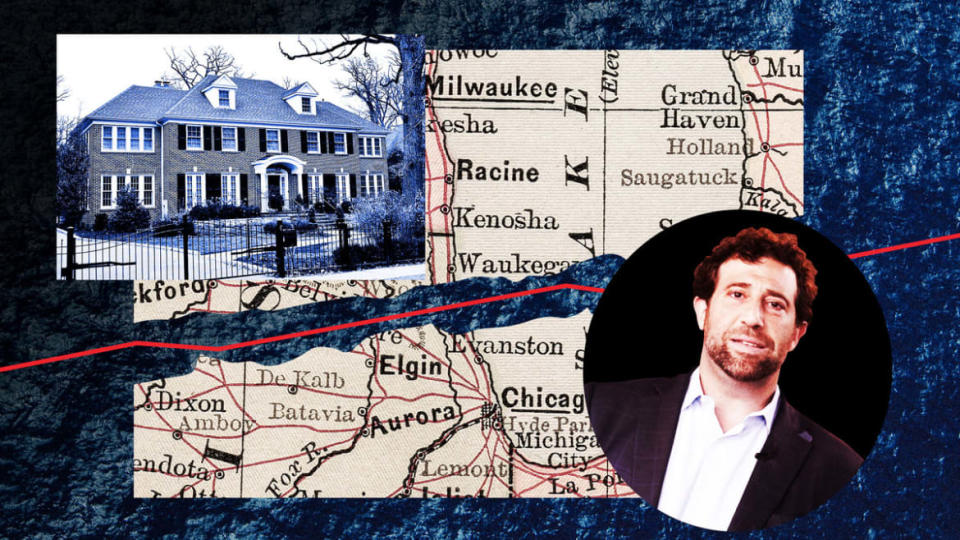Billionaire’s Land Battle With Village Is ‘Parks and Rec’ Come to Life

It has all the markings of a small-town standoff: a property dispute, a wealthy newcomer, bureaucratic dysfunction, 19th century law, and an army of furious dog owners. But Winnetka, Illinois, where this battle is unfolding, is no podunk community. Here, the median owner-occupied house is worth over $1.1 million, and along Lake Michigan, the nexus of the controversy, large estates can pull in 10 times that.
The cast of characters in the saga includes officials on the Winnetka Park District Board of Commissioners—the bureaucrats—and a private equity billionaire, Justin Ishbia, who has snapped up four lakefront properties since 2020.
The tricky bit: one of those houses is sandwiched by two public parks. Around the start of his buying spree, Ishbia agreed to swap that home and its accompanying private beach with the park district in exchange for an equal amount of land to the south—creating a mega-estate for himself and a mega-park for locals.
“I was trying to make a win-win scenario,” he told The Daily Beast.
In recent months, however, the spirit of cooperation has vaporized, and the park district board has descended into infighting, throwing the viability of a deal into serious doubt.
“This issue has divided this community and it's very unfortunate,” said Commissioner Colleen Root, who joined the board in 2021 and has opposed the terms of the land swap.
The crux of the disagreement is the tycoon’s insistence on a barrier between his private beach and the public one, impeding anyone from crossing the property line even along the water, which is generally considered public domain. Ishbia said he wants to protect his young children from potential “conflict,” like the theoretical “18-year-old kid who has a couple beers.” He argued that the beach disappears into the lake on the other side of his property anyway.
To Root and the billionaire’s detractors, the barrier would mark a terrible precedent, enabling a well-heeled landowner to obstruct the public’s access to the coast.
That element of the dispute turns what might be a mundane disagreement into a debate of broader importance—one about the public’s right to natural resources and whether the ultra-rich are allowed to play by a separate set of rules.
“I feel passionately about this. The precedent that could be set here will affect all of Illinois,” Root said.

Colleen Root.
With the controversy growing louder, Ishbia thinks he’s been misunderstood. “I personally thought I was doing good,” he said. But if he can’t hash things out with the commissioners, he’ll build his mega-mansion anyway, albeit on a slightly smaller parcel of land.
“I just don't believe that everyone's thinking through all the steps down the chess board,” he said.
Twenty miles north of Chicago, Winnetka has long been an enclave for the elite. And public discourse in often centers on how best to utilize the community’s extensive resources—like ways to improve its five beaches. Discussions about connecting Centennial and Elder Lane parks—which abut the property now owned by Ishbia—for instance, stretch back at least to the 1990s.
Around that time, the village held a referendum about whether to acquire the sandwiched residence, but it failed, with residents apparently deeming it too expensive. Two decades later, the park district again contemplated acquiring the property, but according to Ishbia wasn’t able to gather the necessary resources. The billionaire agreed to buy it instead.
Ishbia claimed to The Daily Beast that the land swap was contingent on maintaining privacy for his family and securing all necessary permits, and he emphasized that the property he planned to trade was worth over $3 million more than the one he was set to receive.
“I feel like people tend to forget that someone's donating, to my knowledge, the largest donation in the park’s history,” he said.
Originally, the deal sailed through the park district committee, as local outlets like Crain’s Chicago Business and The Record North Shore have previously detailed. Yet after Root joined in 2021, she cried foul. Among her complaints: lack of transparency and public input, and a plan to install metal louvers as a privacy shield for Ishbia.
“When I first saw [the proposals], I couldn’t believe it,” she said.
Meanwhile, Root said, the public learned more details about the land swap and park redevelopment plans, including the scheduled closure of a beloved dog beach. “Oh my goodness, there was a revolution,” she said.
In recent months, the debate has whipped back and forth. Ishbia agreed to drop the metal louvers—even though, he says, there are countless barriers already obstructing beach access along the coast—but he is still demanding a cluster of shrubs and trees to serve as a shield.

Justin Ishbia.
Root and company are holding firm. And two months ago, in what resembled a Shakespearean gambit, she voted with two other members of the board to withdraw a permitting application that had been submitted with Ishbia—while the final two members of the committee were conveniently absent. The measure passed with a single vote.
Despite the close margin, the billionaire has clearly frustrated other commissioners as well. Board president Warren James said in June—in comments reported by The Record—that the committee had considered suing Ishbia over his apparent intransigence, before deciding that “litigating with a billionaire is probably not a good idea.”
Neither Ishbia nor the commissioners seem to know what will happen next. Ishbia, if he persists with the privacy shield, may face pushback in the courts. According to Henry Rose, a professor at the Loyola University Chicago School of Law, a Supreme Court decision in 1892 affirmed the “public trust doctrine,” solidifying the coasts of Lake Michigan as public domain.
The details of the law, though, are murky. Unlike neighboring states Indiana and Michigan, Illinois’ supreme court hasn’t clearly defined what activities and what percentage of the beach are protected, Rose said.
Still, he continued, “I think the Illinois Supreme Court, if it ever had to… would decide that all beachfront property along Lake Michigan in Illinois should be accessible to the public.”
That could complicate Ishbia’s ambitions. “I think a private owner putting up a barrier to the public walking along the shoreline is very legally questionable,” Rose said. “They're facing almost certain litigation.”
Should the deal fall apart, Ishbia’s relatives may emerge as beneficiaries, since the billionaire said he’ll keep his disputed property as a retreat for family members. Perhaps his brother Mat, a fellow billionaire, will come during the warmer months.
And if those relatives get lonely, there will surely be extra room in the main house just down the lake. Ishbia wouldn’t offer details about the blueprints for his planned estate, though it could stretch across his three contiguous lots. “Yeah,” he said cagily, “it’s not going to be 2,000 square feet.”
Get the Daily Beast's biggest scoops and scandals delivered right to your inbox. Sign up now.
Stay informed and gain unlimited access to the Daily Beast's unmatched reporting. Subscribe now.

 Yahoo Movies
Yahoo Movies 